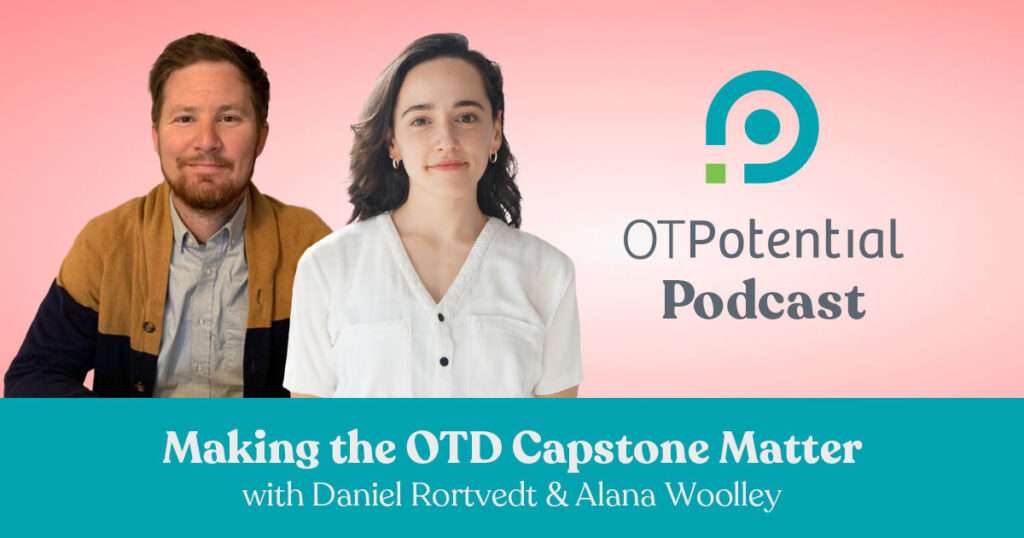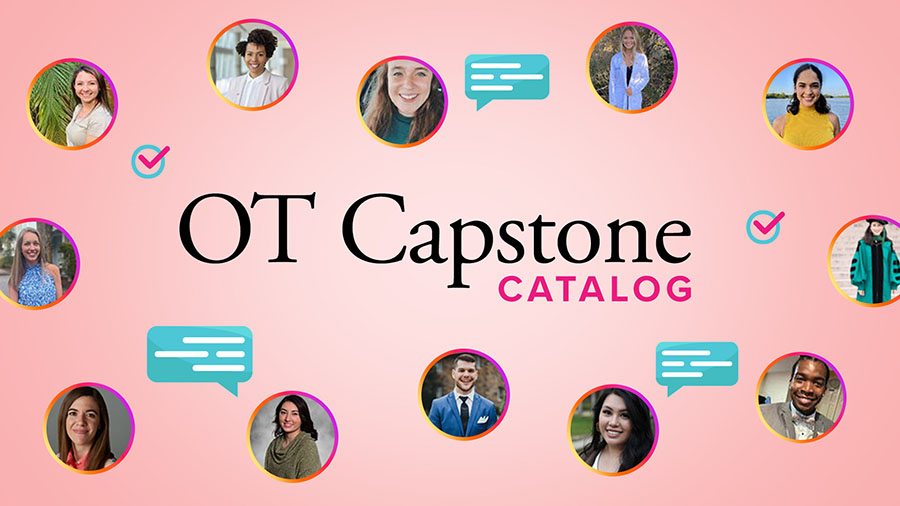As part of an occupational therapy doctoral (OTD) program in the United States, doctoral students spend around 500 hours working on a capstone experience and project.
The purpose of a capstone project is to help students take a deep dive into a specific area of OT, synthesize the information, and then disseminate their findings. These projects have the potential to help OT professionals all over the world improve our clinical practices.
But, until now, it has been difficult to find and read these projects!
In this post, we’ll share:
- How to find projects in our OT Capstone Catalog
- How to submit to the OT Capstone Catalog
- Our directory of capstone mentors
- Our course on being a capstone mentor
Find Ideas and Project Examples in the OT Capstone Catalog
With our new OT Capstone Catalog, OT professionals from around the globe can easily find examples of OTD capstone projects from graduating OTD students. Likewise, other doctoral students can see examples of past projects to help them generate ideas.
And, our favorite part is that students and working professionals who are members of the OT Potential Club can interact about these projects!
The catalog is also free for the public to view.
How the catalog can help you generate ideas for your OTD capstone
Ideally, in occupational therapy, we are always building on one another’s work. So, with the capstone catalog, you can now search nationally to find similar projects that have been done in your focus and practice area. Take the time to read the advice submitted.
And, if you are pursing a project similar to what you find posted in the catalog, we encourage you to leave a comment for the student to see!
Our capstone catalog has a robust search feature. But to get you started, you can browse by the project focus area:
- Clinical practice skills
- Research
- Administration
- Leadership
- Program and development
- Policy development
- Advocacy
- Education
- Theory development
How to submit to the OT Capstone Catalog
For 2025, it is free for capstone students to submit their project to the OT Capstone Catalog!
If your project is accepted, we will share it with our mailing list of over 20,000 OT professionals—now, that’s dissemination!
Here’s all you have to do:
1. Email us
Email us at hello@otpotential.com with the subject, “Capstone Submission” and tell us one sentence about your project. We will set you up with a free 1 year membership to the OT Potential Club, at the email address you email us from!
2. Share an overview of your project
After you've gained access to the Club, submit the following information:
- One sentence description of your project
- Student name
- Name of Mentor
- School
- Capstone setting
- Virtual / In-person / Hybrid
- Capstone Objectives
- Method/Design/Approach
- Results/Outcomes
- Conclusions
- 2-3 ideas for future directions to build on on this project
- Reflections on how you see this project influencing your OT career trajectory.
- How many individuals do you estimate increased their awareness of OT due to your project?
These are meant to be short and sweet, so only 1-2 sentences for each bullet point is encouraged. Your project will live here!
Are you looking for an OT capstone mentor?
The other perk of being part of the OT Potential Club is our incredible network of OTs from around the globe. Within our OT directory, some members have indicated interest in serving as a mentor in particular subject areas. You can see these professionals below.
Curious what the capstone experience is actually like?
It is hard to capture all of the learning and potential of the capstone experience in a post like this.
So, I recorded a podcast-based course with our own capstone student, Alana Woolley, and her capstone coordinator, Daniel Rortvedt. In the course, we discuss some research on the benefits of the capstone experience, and then walk through our advice for creating a great capstone experience.
This episode is really geared toward mentors, but anyone involved in the process may benefit from listening!

Conclusion
At OT Potential, our mission is to help the majority of occupational therapy practitioners from around the globe make a habit of regularly exploring new OT-related research. So, participating in the dissemination of capstone projects has been a natural fit for us. We hope you find it to be a win-win for both students and working practitioners.

